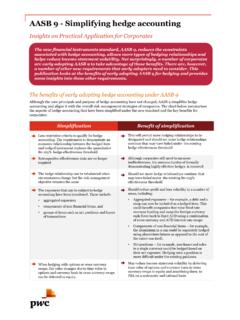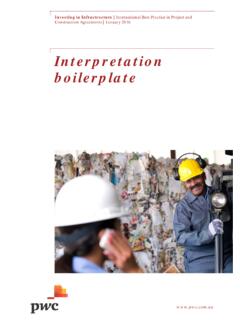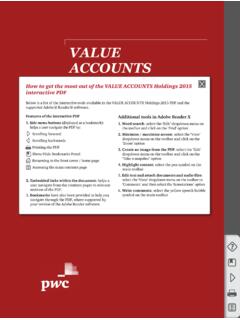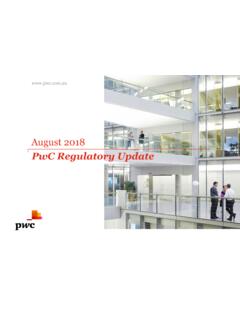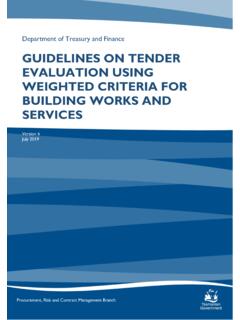Transcription of Legal risk in the tender process - PwC
1 Investing in Infrastructure | International Best Legal Practice in Project and Construction Agreements | January 2016 Damian McNair | Partner, Legal | M: +61 421 899 231 | E: Legal risk in the tender process PwC 3 Legal risk in the tender process Introduction This Update is intended to highlight some of the potential risks associated with the drafting of a request for tender (RFT) and the conduct of a tender process and to provide suggestions as to how those risks may be minimised. Contractual analysis of the tender process When inviting tenders, a party may inadvertently create Legal obligations.
2 That party may rely too heavily on the traditional contractual analysis of the tendering process , unaware that obligations to tenderers have been created. The traditional contractual analysis of the tendering process is that: the issue of a RFT by the party inviting tenders is no more than an invitation to treat, not an offer the submission of a tender in response to the RFT by a tenderer amounts to an offer by that tenderer no binding contract arises between the parties until a tender is accepted by the party inviting tenders. If this traditional contractual analysis was applied strictly to the period up until a contract is awarded to a tenderer (the pre-award period ), there would be no binding Legal relationship between a party inviting tenders and a tendering party during the pre-award period.
3 However, in certain circumstances, courts have been willing to impose binding Legal relationships between the party inviting tenders and a tenderer during the pre-award period. A binding Legal relationship may arise during the pre-award period as a result of: process contracts: A contract arising in relation to the tender process before acceptance of a tender by the party inviting tenders negligence: There may be circumstances in which the party inviting tenders owes a duty of care to a tenderer estoppel: Which may arise from the conduct of, and/or representations made by, the party inviting tenders during the pre-award period statute.
4 For example, in Australia remedies under the Competition and Consumer Act 2010 may be available in relation to conduct of the party inviting tenders during the pre-award period. Under the Act, a person participating in trade or commerce must not engage in conduct that is, or is likely to be, misleading or If a party inviting tenders does not honour its representation that tender evaluation criteria will be complied with, it could be in breach of this requirement. process contracts The courts of Australia, New Zealand, Canada and England have been increasingly willing to find that a process contract exists, binding the party inviting tenders to conduct the tender process during the pre-award period in a particular manner.
5 If a binding process contract exists, an unsuccessful tenderer may be entitled to any loss resulting from a breach of that process contract by the party inviting tenders. As such, a party issuing a RFT should carefully consider whether it intends that the tender process to form a binding Legal relationship. 1 Competition and Consumer Act 2010 (Cth), sch 2, s18. Legal risk in the tender process PwC 4 Risk management strategies There are various alternative courses of action that a party inviting tenders may adopt, in respect of its tendering process , in order to manage the Legal risks discussed above.
6 Binding process contract A party inviting tenders may enter into an express contract with each tenderer in respect of the pre-award period. This would provide a level of certainty regarding the Legal relationship between the party inviting tenders and each tenderer during the pre-award period by expressly stating the terms and conditions governing their relationship. However, this approach would be impractical if each process contract had to be negotiated with each tenderer. Also, it could potentially increase the party inviting tenders exposure to liability in the sense that there would be the potential for such process contracts to be breached in circumstances where a contractual relationship would not have otherwise been found, by a court, to exist.
7 In Australia, there have been a number of decisions that have determined that a process contract has existed between the Commonwealth and tenderers. In Hughes Aircraft Systems International v Airservice Australia,2 a process contract was found to arise out of a public tender for an air traffic system acquisition contract. The court implied terms of fair process and fair dealing. This analysis was adopted in Cubic Transportation Systems Inc v NSW, 3 where the court found that a process contract arose out of a tender and read down a clause in the conditions of tender purporting to exclude a process contract.
8 On those facts, no breach of an implied term was found. In IPEX ITG Pty Ltd (in liq) v State of Victoria,4 the court found that a process contract arose for a request for tender for system integration services. The court found that tender documents will determine if parties intend to be bound by a process contract. A process contract arose in this case because detailed process criteria timelines, which suggested promissory obligations, were used. Parties inviting tenders should be aware that detailed processes in requests for tenders are more likely to give rise to process contracts.
9 Non-binding Assuming that a party inviting tenders does not want to enter into an express process contract, that party must clearly delineate rights and liabilities in the RFT in order to address the uncertainties associated with the potential finding of a binding contractual relationship. Accordingly, the RFT should expressly exclude any intention for a binding contractual relationship between the parties to be formed during the pre-award period or, at least, limit the extent of any binding Legal relationship. Suitable wording to make clear that the party inviting tenders has adequate time to review the tenders, but that no further Legal relationship is intended to be formed, would be.
10 No binding Legal relationship will exist between any tenderer and the Principal until the successful tenderer and the Principal execute the Flexibility for party inviting tenders What a RFT should allow for Whether a party inviting tenders decides to create an expressly binding process contract or not, various waivers and conditions of tender should be included in an RFT, so that they form part of any process contract which the 2 (1997) 146 ALR 1. 3 [2002] NSWSC 656 4 [2010] VSC 480.
